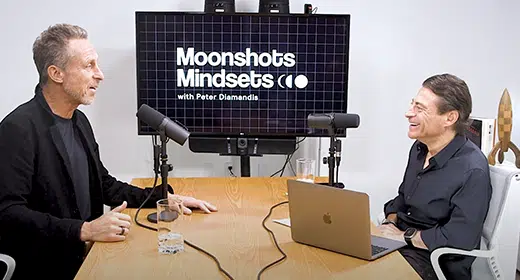by Peter Diamandis: What can you do TODAY to add 10, 20, or even 30 healthy years to your life?
 How can Functional Medicine help you shift from a mindset of diseasetreatment to one of health creation?
How can Functional Medicine help you shift from a mindset of diseasetreatment to one of health creation?
I recently sat down with Dr. Mark Hyman, MD—a physician and author of the bestselling book Young Forever—to discuss these topics during my Moonshots and Mindsets podcast. Dr. Hyman was also one of the Speakers during my recent Abundance360 Summit, Singularity University’s highest-level program.
Young Forever (Hyman’s most recent bestselling book) is a practical guide with a roadmap of your body, how it works, and how to hack diet, sleep, exercise, and modern medicine to add healthy years to your life.
In today’s blog—the second in this three-part series based on Dr. Hyman’s research—we’ll zoom into 5 simple steps you can take to control (even reverse!) your biological aging.
We’ll also look at the tools you can use to intercept the next-generation therapeutics coming your way and learn what Dr. Hyman considers the single most important hallmark of aging.
HOW TO AFFORDABLY REVERSE YOUR BIOLOGICAL AGING
Out of the safe and effective age-reversing therapies available today, Dr. Hyman remarks, some 80% are free of charge.
Lifestyle choices constantly influence your cellular aging.
Experimental interventions like Rapamycin, NAD boosters, exosomes, total plasma exchange, stem cells, and metformin may soon be proven to extend the human healthspan. (The research is ongoing.)
But, as Dr. Hyman remarks, these existing therapies “won’t go very far if you’re not also changing your lifestyle.”
What are the steps you can take today that might allow you to intercept those longevity-extending technologies arriving in the decade ahead?
5 STEPS YOU CAN TAKE TODAY TO EXTEND YOUR HEALTHSPAN
1. Muscle Growth
“Muscle mass,” Dr. Hyman tells me, “is the currency of longevity.”
Your muscle mass directly correlates with your longevity.
This is why I personally set a goal of adding 10 pounds of muscle mass to my body in 2023 (thus far I’m up 4 pounds in the first few months).
Here are 5 reasons why adding muscle benefits you.
- Muscle mass helps to regulate blood sugar levels. When you have more muscle mass, your body is better able to use glucose for energy, which can help to keep your blood sugar levels in check helping to prevent heart disease, stroke, and diabetes.
- Muscle mass helps to boost metabolism. The more muscle mass you have, the more calories you burn at rest allowing you to maintain a healthy weight.
- Muscle mass helps to protect bones. Strong muscles help to support your bones and reduce your risk of osteoporosis and fractures. “If you fall and break your hip or your pelvis,” Dr. Hyman notes, “70% of people over the age of 65 who have that injury will die within a year secondary to complications such as pneumonia.”
- Muscle mass helps to improve balance and coordination. As you get older, it’s important to maintain good balance and coordination to reduce your risk of falls. Strong muscles can help you to stay upright and prevent falls.
- Muscle mass helps to improve mental health. Exercise, which is important for building muscle mass, has been shown to improve mood, reduce stress, and boost cognitive function.
So how do you add muscle? Strength training 2-3 times a week is essential for longevity, with a focus on compound exercises that target multiple muscle groups, with progressively increasing weights. Increased protein intake (see below) and the use of creatine.
Creatine is an amino acid that is found naturally in muscle cells. It helps to produce energy by providing a phosphate group that can be used to regenerate adenosine triphosphate (ATP), which is the body’s main source of energy. Creatine also helps to increase the amount of water that is stored in muscle cells, which can lead to an increase in muscle size and strength.
A number of studies have shown that creatine supplementation can help to increase muscle mass and strength. One study found that people who took creatine supplements for 10 weeks gained an average of 5.3 pounds of muscle mass, while people who took a placebo gained an average of 2.3 pounds of muscle mass.
Another key factor about muscle building—on top of hard work at the gym—is a rate-limiting amino acid called leucine. If you’re low on leucine, Dr. Hyman goes on, “it’s hard to turn on muscle synthesis.” To get it, you need tons of protein—and if we’re talking plant-based protein, you may need “more than you could possibly eat.”
Which brings us to the next practical step you should take to increase your healthspan: protein intake!
2. Protein Intake
Protein is an essential building block of life.
You need it for building and repairing tissues like muscles, bones, and skin, as well as for producing hormones and enzymes; transporting nutrients and oxygen; supporting immune function; and providing energy to each of your cells.
Dr. Hyman notes that “some believe we should limit protein (especially animal protein) and amino acids to silence mTOR and activate autophagy.” But, he adds, the data isn’t so clear: when we abstain from animal proteins altogether, and the longevity pathway mTOR becomes “silenced for long periods, we can’t create new proteins or build muscle.”
So it’s necessary to oscillate between “periods of fasting or caloric restriction (which silences mTOR) with periods of adequate high-quality protein (which activates mTOR) to maintain and build new muscle.”
The average adult needs around 50 grams of protein a day. And if you’re trying to add muscle mass to your frame, you may need to double or triple that intake (personally, I weigh 145 pounds and I target consuming 150 grams of protein per day).
It is, as Dr. Hyman notes, “a Goldilocks problem. You want mTOR so you can build muscle, [but] you also want to give it a break so you can do cleanup and repair.”
Which brings us to the next item: Calorie restriction!
3. Calorie Restriction
Harvard geneticist and Lifespan author David Sinclair, PhD who has spent 25 years studying aging, says that if there’s one piece of advice he would offer, it’s to eat less often.
One approach is to skip breakfast and have a late lunch. Another is to eat 75% fewer calories two days each week.
A 2019 study published in the journal Cell Metabolism found that fasting can improve metabolic function and protect you against the diseases of aging—like cancers, heart diseases, and diabetes—by promoting the production of certain proteins in the body.
In animal models, intermittent fasting is shown to aid in weight loss, reduce inflammation, improve insulin sensitivity, improve metabolic function, and quite substantially increase longevity.
During fasting, the body shifts from using glucose to using stored fat as its primary energy source, entering the process of autophagy—or “self-cannibalism,” as Dr. Hyman calls it.
I personally do my best to fast between 7pm and 12 noon the next day, providing me a 17-hour fast. On some days, I eat one meal per day, typically a lunch, and on other days, I fast between 7pm the night before and 3pm the next day (a 20-hour fast).
Dr. Hyman, for example, sticks to a 14-hour minimum fast. (When he breaks his fast, he generally opts for protein shakes, or large vegetable portions paired with lean meats!)
4. Avoid Sugar
To me, the most obvious nutrition rule is: sugar = poison.
Sugar causes inflammation, cardiovascular disease, and fuels cancer. Reduced blood sugar levels have been linked to lower blood pressure and cholesterol and have been shown to lower the risk of heart attack, stroke, and heart-related death.
Dr. Hyman notes that “when you eat sugar, it slows your metabolism down, and it increases hunger hormones. So you’re hungrier, you’re gaining weight, and you can’t burn the fat.”
For males, as well as for females, sugar intake results in significant hormonal problems—and perhaps most shockingly, new evidence proves that sugar shrinks your hippocampus, which is your memory center.
So the next time you have a sugar craving, think about how it may literally shrink your brain cells!
This is why every January (along with my Abundance360 community) we start the year with a 22-day sugar-free (and carb-free) fast lead by Dr. Guillermo Rodríguez Navarrete. Participating in this 22-day program alongside friends (in a massive and very active WhatsApp group of Abundance360 members) has been fun, transformational, and easy. The community collectively holds each member accountable for a sugar and carb fast.
As Dr. Hyman remarks, “93% of Americans are metabolically unhealthy… they have high blood sugar, high cholesterol, high blood pressure, or they’re overweight, or they have had a heart attack or a stroke.”
This means, in effect, that a mere 6% of us are in good metabolic health. And, Dr. Hyman goes on, “that’s driven by our diet primarily.”
5. Adopt a Longevity Mindset
In part, how long you live is a function of your mindset. You can actively “will yourself to death”… or “will yourself to a longer healthspan.”
One study found that having “purpose and meaning in your life can add 7+ years to your healthspan.”
My dear friend and coach Dan Sullivan is fond of saying, “Your future needs to be bigger than your past!”
It may seem obvious, but each of us has the ability to shape our mindset by virtue of what we read, who we hang out with, and the conversations we have.
What Longevity Mindset do you have?
Is it one that believes your likely to die at the same age as your parents?
Or a mindset shaped by reading about the incredible breakthroughs coming your way this decade? … Breakthroughs which are likely to add 20 or 30 healthy years to our healthspan.
At a minimum, it’s essential to actively seek a life of purpose and greater meaning, to aim for a life whose future is greater than your past.
FINAL THOUGHTS
As Dr. Hyman emphasizes, “based on the science we have now, we understand the basic ingredients for health, the science of creating health.”
But as I’ve said elsewhere, knowledge alone isn’t power.
It’s what you do with that knowledge that determines who you can become.
So, what will YOU do with the knowledge that with the correct lifestyle choices, you may be able to add another 20 or 30 years to your healthspan?
Will you accept the social norms that dictate life expectancy in the United States, which for females should be about 80 years, and for males, roughly 75 years—believing there is nothing you can do about it—or will you choose to become the CEO of your own health?
Read and watch Pt 1 Here: Young Forever Pt 1: A Conversation With Mark Hyman, MD – Peter Diamandis
Read Pt 3 Here: Young Forever Pt 3: Understanding The Hallmarks Of Aging – Peter Diamandis & Mark Hyman
















































